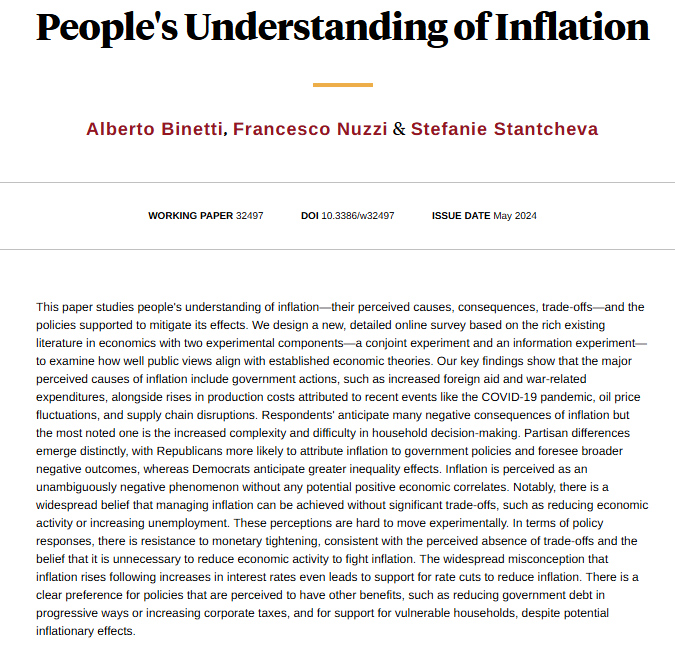
Alberto Binetti
@al_bi99
Naples // @unibocconi // @princetonecon
ID: 1438072218
https://albertobinetti.github.io 18-05-2013 11:06:57
16 Tweet
159 Followers
411 Following


Great papers on inflation in the Covid era and beyond, today and tomorrow at the NBER conference . Livestreamed too! nber.org/conferences/in… Excited to be presenting our new paper on "People's Understanding of Inflation" (joint with Francesco Nuzzi and Alberto Binetti).

HCEO member Stefanie Stantcheva and colleagues illuminate people's understanding of where inflation comes from. They find the most common perceived negative consequence of inflation is increased complexity and difficulty in household decision-making. nber.org/papers/w32497

A new survey sheds light on how people understand the causes, consequences, and trade-offs of inflation, and how they think inflation should be managed, from Alberto Binetti, Francesco Nuzzi, and Stefanie Stantcheva nber.org/papers/w32497


Thanks for covering our research on inflation The Guardian! theguardian.com/us-news/articl…

New CEPR Discussion Paper - DP19178 People’s Understanding of #Inflation Alberto Binetti Università Bocconi, Francesco Nuzzi Harvard University Harvard Department of Economics, Stefanie Stantcheva Harvard University Harvard Department of Economics ow.ly/1vwx50Sp9VI #CEPR_MEF, #CEPR_MG #economics


I thrilled to share my first arXiv WP: "A short note on Event-Study SDID" . It comes with a Stata package, sdid_event, available on Github (see footnote 1)! Many thanks to Daniel Pailañir and Damian Clarke for their feedback and inspiring work on SDID! arxiv.org/abs/2407.09565




Thrilled to share my new paper for my Coase Lecture LSE. I outline my thinking on perceptions & mindsets shaping our policy views- on taxation, climate change, inflation & trade. A wonderful opportunity to share recent research which I am grateful for socialeconomicslab.org/research/publi…

🚨 New data alert! Curious about how people really understand inflation—its causes, impacts & what governments should do about it? 📊 You can dive into the data from our project "People's understanding of inflation" here: socialeconomicslab.org/research/publi… Excited to see new analyses!




